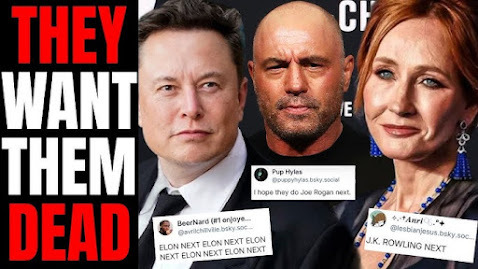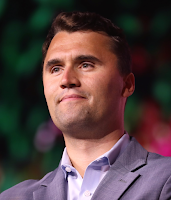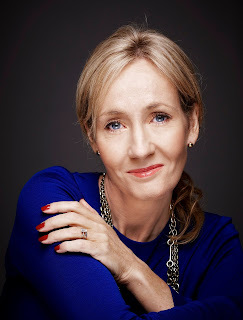Charlie Kirk, J.K. Rowling, and the Dark Forces Unleashed

I revisited the topic of an article I published yesterday in Italian on Money.it to write a post in English for my English-speaking friends and readers.

How a single act of violence has unleashed cultural, political, andideological forces now entangling even J.K. Rowling
 Charlie KirkLike theancient myth of Pandora’s box, the assassination of Charlie Kirk has set loosea swarm of dark forces—ideological, political, and personal—that now entangleeven figures far from the crime itself, among them J.K. Rowling, the author ofthe Harry Potter saga.
Charlie KirkLike theancient myth of Pandora’s box, the assassination of Charlie Kirk has set loosea swarm of dark forces—ideological, political, and personal—that now entangleeven figures far from the crime itself, among them J.K. Rowling, the author ofthe Harry Potter saga.Rowling,for her part, has always been careful to emphasize that she supports the rightof transgender people to live free from discrimination, harassment, andviolence. Yet she has just as firmly insisted on the importance of preservingthe reality of biological sex and of acknowledging the differences between menand women as fundamental to safeguarding women’s rights. This dualposition—affirming dignity and equality for transgender individuals whilerejecting the erasure of sex-based distinctions—has placed her at the verycenter of one of the most polarizing debates of our time. Unsurprisingly, herstance has drawn fierce accusations of transphobia from activists andsignificant segments of the media. But it has also earned her the backing of abroader movement—feminists, conservatives, free-speech advocates, and ordinarycitizens alike—who argue that the ability to critically examine gender policieswithout being silenced or branded as hateful is itself a cornerstone of anyfree society.
 J.K. RowlingThecontroversy has left an indelible mark on Rowling’s public image. On one side,she has faced intense backlash—even from longtime admirers of the Harry Pottersaga and members of the film’s cast—who accuse her of betraying the inclusivespirit they associate with her work. On the other, her refusal to recant haselevated her into a symbolic figure of resistance against what many view as anew ideological orthodoxy surrounding gender identity. To her critics, she hasbecome a cautionary tale of privilege and prejudice; to her supporters, sherepresents courage, intellectual honesty, and the willingness to endureprofessional and personal costs for the sake of principle. In this sense,Rowling now embodies a paradox of modern public life: the more she is vilifiedin certain circles, the more she is venerated in others, a lightning rod notonly for debates about gender but for broader questions of free speech,tolerance, and the limits of cultural conformity.
J.K. RowlingThecontroversy has left an indelible mark on Rowling’s public image. On one side,she has faced intense backlash—even from longtime admirers of the Harry Pottersaga and members of the film’s cast—who accuse her of betraying the inclusivespirit they associate with her work. On the other, her refusal to recant haselevated her into a symbolic figure of resistance against what many view as anew ideological orthodoxy surrounding gender identity. To her critics, she hasbecome a cautionary tale of privilege and prejudice; to her supporters, sherepresents courage, intellectual honesty, and the willingness to endureprofessional and personal costs for the sake of principle. In this sense,Rowling now embodies a paradox of modern public life: the more she is vilifiedin certain circles, the more she is venerated in others, a lightning rod notonly for debates about gender but for broader questions of free speech,tolerance, and the limits of cultural conformity.The latestdevelopment, reported by Alex Farber in the London Times, hasadded a disturbing new dimension. On Bluesky—the social media platform embracedby much of the progressive left as a “liberal” alternative to X after ElonMusk’s takeover of Twitter—several users celebrated Kirk’s death with grotesqueenthusiasm and went so far as to suggest that J.K. Rowling should be “next.” Inthe fevered rhetoric of these online echo chambers, political opponents are notmerely to be silenced but erased altogether. One chilling post read: “I’m glad that guy’s dead, but they’rereally overdoing it with the whole ‘Oh, this is a dark day for America’ stuffabout someone I’d never even heard of until he got shot. Can we get J.K.Rowling next? The U.K. would be heartbroken, but it’s for the greater good oftrans people.” Such words, repellent in any context, reveal not only thebrutalization of public discourse but also the extent to which violence hasbeen normalized by the left as a legitimate tool of ideological struggle.
The listsof enemies drawn up in these digital forums are long and telling. AlongsideRowling, they include some of the most prominent figures in Americanconservatism—Donald J. Trump, Elon Musk, Matt Walsh, Michael Knowles, and BenShapiro, a close friend of Kirk, among others. To see such names casuallygrouped together in what amounts to a virtual proscription list speaks volumesabout the climate of political hostility that now pervades sections of theonline left. The spectacle is ignoble, yet not surprising: when the language ofannihilation becomes commonplace, when opponents are caricatured as existentialthreats rather than fellow citizens, the step from rhetoric to justification ofviolence becomes perilously short. Bluesky, to its credit, eventuallyintervened, cautioning users against “glorifying violence.” But the very factthat such a warning was necessary illustrates how deeply the poison has seepedinto the bloodstream of political discourse.
Rowlingherself responded forcefully last Thursday on X, condemning the Bluesky commentators as“illiberal,” incapable of tolerating the free speech of their opponents, andwarning that political violence is indistinguishable from terrorism. In a postthat quickly circulated across platforms, she offered a taxonomy of extremismwith characteristic clarity: “If you believe that free speech applies to youbut not to your political opponents, you’re illiberal. If no evidence to thecontrary can ever change your beliefs, you’re a fundamentalist. If you believethe state should punish people for opposing opinions, you’re a totalitarian. Ifyou believe political opponents should be punished with violence or death,you’re a terrorist.” It was a sharp rebuke, but also a statement ofprinciple: Rowling was reminding her detractors that the real test of libertylies not in defending speech we welcome, but in tolerating speech we despise.Her intervention thus transformed a personal attack into a broader indictmentof a political culture increasingly willing to sacrifice freedom on the altarof ideological purity.
 Graham LinehanJust daysearlier, Rowling had already made headlines with a fierce attack on the Britishgovernment after the arrest of Irish comedian Graham Linehan, accused ofposting critical comments about transgender ideology. Linehan was detained atHeathrow Airport by no fewer than five armed officers. He later said he hadbeen treated “like a terrorist,” locked in a cell, and even hospitalized due tostress. Authorities also barred him from using social media. “In a countrywhere paedophiles escape sentencing, where knife crime is out of control, wherewomen are assaulted and harassed every time they gather to speak, the state hadmobilised five armed officers to arrest a comedy writer for this tweet (and no,I promise you, I am not making this up),” Linehan
wrote
on his Substack.
Graham LinehanJust daysearlier, Rowling had already made headlines with a fierce attack on the Britishgovernment after the arrest of Irish comedian Graham Linehan, accused ofposting critical comments about transgender ideology. Linehan was detained atHeathrow Airport by no fewer than five armed officers. He later said he hadbeen treated “like a terrorist,” locked in a cell, and even hospitalized due tostress. Authorities also barred him from using social media. “In a countrywhere paedophiles escape sentencing, where knife crime is out of control, wherewomen are assaulted and harassed every time they gather to speak, the state hadmobilised five armed officers to arrest a comedy writer for this tweet (and no,I promise you, I am not making this up),” Linehan
wrote
on his Substack.Rowling reacted with outrage: “What the fuck has the UKbecome? This is totalitarianism. Utterly deplorable,” she posted on X. Forhis part, Linehan argued the incident shows Britain has become “hostile to freespeech and women,” while police “bow to pressure from violent, abusive menpretending to be women.” “I was arrested at an airport like a terrorist, lockedin a cell like a criminal, taken to hospital because the stress nearly killedme, and banned from speaking online—all because I made jokes that upset somepsychotic crossdressers,” he wrote on his Substack..
At thispoint, the soundest advice for Linehan, Rowling, and all those who refuse tomarch in lockstep with the orthodoxy broadcast by mainstream media would be toremain vigilant, to measure their public exposure, and, when possible, to avoidunnecessary risks. Such is the paradox of the “free” West—ostensibly the cradleof liberty and civil rights, yet increasingly a place where dissent must bewhispered and conviction comes at a cost. Still, one suspects that such counselwill go largely unheeded. People who have already had the courage to alienatetheir peers, challenge the institutions of the state, and withstand thenear-unanimous hostility of the press are not in the habit of retreating. Theyare, in the truest sense, figures of uncommon moral stature. They areheroes—deeply flawed perhaps, but heroic nonetheless—and as such they deserveto be honored, not posthumously with platitudes, but while they yet stand amongus, bearing the weight of their convictions.

COPYRIGHT NOTICE:All original content of this blog [Wind Rose Hotel] is subject to Creative Commons license (by-nc-sa)



